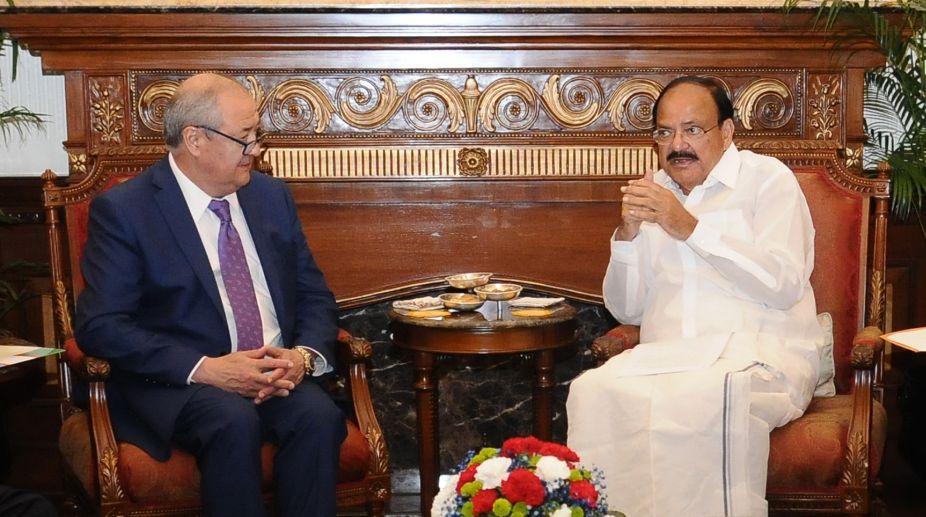Afghanistan: WHO reports surge in acute respiratory disease
According to the WHO report, more than 206,000 people were infected with respiratory diseases during this period, out of which 506 lost their lives.
Uzbek Foreign Minister Abdulaziz Kamilov had last month visited India and personally invited External Affairs Minister Sushma Swaraj for the conference

Uzbekistan Minister of Foreign Affairs Abdulaziz Kamilov calls on Vice President M Venkaiah Naidu in New Delhi on Aug 22, 2017. (Photo: PIB/File)
India is expected to highlight Pakistan’s role in aiding and abetting terrorism in Afghanistan apart from flagging its concerns with regard to involving the Taliban in the peace talks at the two-day global conference on Afghanistan being hosted by Uzbekistan on 26-27 March.
According to informed sources, India is likely to make it unequivocally clear that any peace process in the war-torn nation must be ‘Afghan-led and Afghan-owned’. New Delhi would also reiterate its stand that the Taliban ranks must eschew violence and affirm their full faith in the Afghan Constitution if they wished to join the peace process.
Advertisement
Uzbek Foreign Minister Abdulaziz Kamilov had last month visited India and personally invited External Affairs Minister Sushma Swaraj for the conference. Kamilov had also briefed the Indian minister of the preparations being made at Tashkent for the conference with focus on peace, security and regional cooperation to enable Afghanistan to stand on its own feet.
Advertisement
Sources said the composition of the Indian delegation to the conference was being finalised. Indications are that it would be headed by Minister of State for External Affairs MJ Akbar. India would also highlight its development activities in Afghanistan and more infrastructure projects it proposed to take up in the war-torn nation.
Sources said India’s main emphasis would be on Pakistan-sponsored terrorism in Afghanistan which has nullified all the efforts by the international community to restore peace in the country. India would call upon Afghanistan’s neighbours (read Pakistan) to stop providing safe havens to terrorist networks which continued to target innocent people and vital assets in Afghanistan.
Afghanistan has itself time and again blamed Pakistan for the spurt in terror attacks in the embattled country. As a result, relations between Afghanistan and Pakistan are also far from normal.
Uzbekistan, as a close neighbour of Afghanistan, has always been an advocate for the peaceful political settlement of the situation in the embattled nation. Keeping this in mind, Uzbek President Shavkat Mirziyoyev has taken the initiative of organising the conference. Its theme will be “Peace Process, Security Cooperation and Regional Connectivity”.
Uzbek President Mirziyoyev and Afghan President Ashraf Ghani will deliver key-note speeches at the opening ceremony of the conference.
Among those invited to the Tashkent meeting are UN Secretary General Antonio Guterres and Special Representative of the Organisation for Afghanistan Tadamichi Yamamoto, EU High Representative for Foreign Affairs and Security Policy Federica Mogherini, as well as ministers of China, Russia, the United States, the United Kingdom, France, Germany, Italy, Turkey, India, Iran, Pakistan, Kazakhstan, Kyrgyzstan, Tajikistan, Turkmenistan, Saudi Arabia and the United Arab Emirates.
The conference is expected to conclude with adoption of the ‘Tashkent Declaration’, which is expected to reflect the following key points:
Advertisement